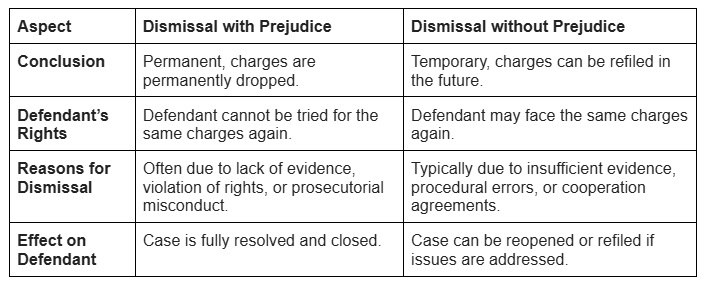Understanding the Difference Between Dismissal with Prejudice and Dismissal without Prejudice
In criminal law, the terms "dismissal with prejudice" and "dismissal without prejudice" carry significant implications for both the defendant and the prosecution. While these terms are often used in litigation, they also play an essential role in criminal cases. In this blog post, we will explain the key differences between dismissal with prejudice and dismissal without prejudice in the context of criminal charges, and how these distinctions impact the outcome of a case.
What is Dismissal with Prejudice?
A dismissal with prejudice means that a case is dismissed permanently. In other words, the court has decided that the matter has been resolved, and the prosecution is barred from bringing the same charges again in the future. The legal grounds for a dismissal with prejudice could include various reasons, such as:
- Lack of evidence: If the prosecution does not have enough evidence to proceed, the case may be dismissed with prejudice.
- Violation of the defendant's rights: If the defendant's constitutional rights were violated during the investigation or trial, such as through an unlawful search or coerced confession, the court might dismiss the charges with prejudice.
- Failure to bring the case to trial within the legal time limits: Criminal cases are subject to statutes of limitations, which vary depending on the severity of the crime. If the prosecution fails to meet these deadlines, the case might be dismissed with prejudice.
- Prosecutorial misconduct: If the prosecution engages in unethical conduct, such as withholding exculpatory evidence, a judge might dismiss the case with prejudice.
- Double jeopardy: If the defendant has already been tried or acquitted for the same crime, further prosecution would violate the principle of double jeopardy, leading to a dismissal with prejudice.
Once charges are dismissed with prejudice, the defendant cannot be tried again on the same charges, even if new evidence emerges later. It is a final resolution to the criminal case, offering the defendant a sense of closure and protection from future prosecution on the same matter.
What is Dismissal without Prejudice?
A dismissal without prejudice in a criminal case means that the charges are dropped, but the prosecution retains the right to refile the charges at a later time. This type of dismissal allows the prosecution to correct issues or gather additional evidence before bringing the case back to court. Here are some common reasons a criminal case might be dismissed without prejudice:
- Insufficient evidence at the time: If the prosecution does not have enough evidence to prove the defendant's guilt, but they believe more evidence may surface later, they might request a dismissal without prejudice.
- Defective charging documents: If there is an issue with the way the charges were filed - such as an error in the indictment or a procedural mistake - the prosecution may dismiss the case without prejudice, giving them the chance to correct the issues and refile the charges.
- Cooperation agreements: In some cases, the prosecution might dismiss charges without prejudice in exchange for the defendant's cooperation in another investigation or case.
A dismissal without prejudice means the defendant is not fully cleared of those charges and could face prosecution in the future, depending on whether the prosecution chooses to refile the case.
Key Differences Between Dismissal with Prejudice and Dismissal without Prejudice
Now that we've defined both terms, let's summarize the key differences between them:
Why Does the Difference Matter?
The distinction between a dismissal with prejudice and without prejudice is crucial in criminal law because it directly impacts the defendant's future. A dismissal with prejudice offers a resolution and guarantees that the defendant cannot be retried on the same charges. This can be a significant win for the defense, especially in cases where the evidence is weak, or where the prosecution has mishandled the case.
Conversely, a dismissal without prejudice means that while the defendant may walk free for the time being, the possibility of being charged again looms over them. It's a temporary reprieve, not a permanent victory. The defendant could be retried if the prosecution resolves any issues with the case or gathers new evidence that strengthens their position.
Common Scenarios in Criminal Cases
- Drug Offenses: A defendant facing drug charges might have their case dismissed without prejudice if there are issues with the chain of custody for evidence. If the prosecution is able to correct this problem and gather stronger evidence, they may refile the charges.
- Homicide Cases: In high-profile cases. if a prosecutor is unable to proceed due to a lack of witness testimony or evidence, the case may be dismissed without prejudice. However, the prosecution could choose to reopen the case later if new evidence is discovered.
- Theft or Assault Charges: If a defendant faces theft or assault charges, and there is a procedural mistake in the indictment, the prosecution might dismiss the case without prejudice to correct the error and refile the charges properly.
Conclusion
In criminal law, the terms "dismissal with prejudice" and "dismissal without prejudice" represent significant outcomes in a case. A dismissal with prejudice offers a defendant a conclusion and protection from being retried, while a dismissal without prejudice allows the prosecution the possibility to refile charges at a later time. For defendants, understanding these distinctions is crucial as they determine the future course of a criminal case.
If you are facing criminal charges, it's important to seek legal representation from an experienced criminal defense attorney. At Vollor Law Firm, P.A. we have the knowledge and experience to help you. Go with a firm that has a history of success handling these cases. Contact us today to schedule a consultation.


